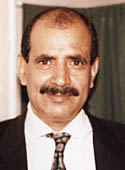
“National health insurance is a must in Yemen” [Archives:1998/39/Interview]
September 28 1998

Then there is the problem associated with archaic socio-cultural values. Urinary tract problems inevitably force the patients to expose one’s private parts. Of course, patients at the end have to accept their predicaments.
Dr. Ahmed Al-Ahnoumi is one of a few specialists in the field in this country. He received his B.Sc. and Ph.D. from Germany. He worked for several years at Al-Thawra General Hospital. Now he runs a private clinic in Sanaa.
Mohammed Bin Sallam of Yemen Times talked to Dr. Al-Ahnoumi at his clinic and filed the following interview.
Q: Could you tell us about the current state of private and public hospitals in Yemen?
A: Conditions in our hospitals are not what they should be. They lack in many essential facilities and diagnostic and treatment services.
Q: What are the most common urinary tract diseases in Yemen?
A: The main compliant in Yemen is bladder and kidney stone, especially among men and children. Unfortunately, there are no statistics to help us find a general pattern and figure out the main causes. About 10% to 13% of childhood illnesses are in the urinary tract.
Among children, untreated chronic diarrhea is a major cause of bladder stones. Other disorders in the digestive system may also create similar problems in the bladder and kidney. Polluted food and water, especially with high salinity, are to blame.
Sometimes we get cases of children as young as nine months with stones in their urinary tract. Other prevalent diseases include bilharzia in addition to a few other seasonal ailments. Renal tuberculosis is also widespread in Yemen.
Sometimes we get quite advanced cases of bladder stone. Cancerous tumors in the urinary tract among children and adults come in last in the order of prevalence. Cancers can only be treated by surgery. Chemotherapy and radiotherapy are not very well advanced here in Yemen.
Q: Where are these diseases most prevalent?
A: Urinary tract diseases are mainly endemic in Hajja, Mahweet, Tajj, Reima, Wadi Binaa, Wadi Al-Barakani in Taiz, and the Sanaa basin. Bilharzia poses a serious problem in Wadi Al-Barakani due to the widespread of stagnant water.
Q: Have you conducted a study on bilharzia?
A: Yes, my study on bilharzia revealed that cancers caused by bilharzia are quite prevalent among people aged between 25 and 50 years.
I also have a joint project with the Tropical Diseases Institute to compare conventional and modern methods of treating bilharzia. In Yemen we still use the classic method of periodical treatment.
Q: Are there any special clinics or hospitals to treat urinary diseases?
A: No, there are no special centers wholly devoted to renal and urinary diseases. However, there are special departments at different hospitals that deal with these illnesses. Endoscopy is often used, especially in cases of prostate tumors.
Q: Can kidney transplant operation be performed in Yemen?
A: There are no facilities for kidney transplant surgeries in Yemen. There are no attempts to actually perform these complicated operations, either. What took place in Yemen recently was not a full transplant operation, but was part of a treatment procedure.
Kidney transplant requires modern tissue compatibility test facilities, which do not exist in this country. Kidney transplant also requires a whole program of tests and analysis to find suitable donors.
In Holland, for example, there is a whole data-bank in which detailed information is kept on kidney patients and their possible donors. All these facilities do not exist in Yemen.
I believe there is a project, sponsored by the World Bank, to establish a kidney transplant center in Yemen. But I do not know which stage has this project reached.
Q: Which hospitals have kidney dialysis facilities?
A: There are only two places that do kidney dialysis in this country, Al-Thawra and the Military hospitals. People with kidney trouble flock to these hospitals. There are outstanding plans to establish three more centers in Aden, Hodeida, and Hadhramaut.
Q: What about the poor people who cannot afford expensive medical care?
A: The problem lies in the call to privatize state hospitals. I do not think the government is going to completely privatize public hospitals, because most of the people in Yemen are poor and have to rely on the cheaper state-owned health establishments. This is especially so in the last few years; poverty has become more widespread.
As a matter of fact, public hospitals are almost privatized now, anyway. If the government will really fully privatize public hospitals, it has to first look for real solutions for providing health care to the poor.
One of these solutions is to establish a health insurance system, especially for public employees. Some private companies already provide their employees with health insurance. A comprehensive national health service must be established for people without public employment.
Q: Why don’t Yemeni doctors allocate a special day every week to treat poor people, free of charge?
A: I am fully prepared to donate a day or a few hours of my time to treat poor people freely. Along with a number of my colleagues, we can establish such a system. But some doctors are themselves poorly paid and live in rather hard conditions. With small salaries, they have to pay rents, bills, taxes, not to speak of other essential living expenses.
Q: Any last comment?
A: I urge the Ministry of Public Health to pay as much attention as possible to preventive medicine. Special public health awareness programs must be broadcast through the radio and TV to help people avoid contracting diseases.
I also call on all international health organizations to support the Ministry of Public Health in its preventive medicine programs. This will hopefully alleviate some of the suffering of the Yemeni people.
——
[archive-e:39-v:1998-y:1998-d:1998-09-28-p:./1998/iss39/intrview.htm]


